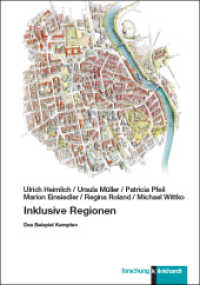- ホーム
- > 洋書
- > 英文書
- > Politics / International Relations
Full Description
How did educated Westerners make an enemy of an inspiration that has changed the lives of billions? Why is nationalism synonymous with atavism, fanaticism, xenophobia, and bloodshed? In this book, Robert Wiebe argues that we too often conflate nationalism with what states do in its name. By indiscriminately blaming it for terrorism, ethnic cleansing, and military thuggery, we avoid reckoning with nationalism for what it is: the desire among people who believe they share a common ancestry and destiny to live under their own government on land sacred to their history. For at least a century and a half, nationalism has been an effective answer to basic questions of identity and connection in a fluid world. It quiets fears of cultural disintegration and allows people to pursue closer bonds and seek freedom. By looking at nationalism in this clearer light and by juxtaposing it with its two great companion and competitor movements--democracy and socialism--Wiebe is able to understand nationalism's deep appeal and assess its historical record.
Because Europeans and their kin abroad monopolized nationalism before World War I, Wiebe begins with their story, identifying migration as a motive force and examining related developments in state building, race theory, church ambition, and linguistic innovation. After case studies of Irish, German, and Jewish nationalism, Wiebe moves to the United States. He discusses America's distinctive place in transatlantic history, emphasizing its liberal government, cultural diversity, and racism. He then traces nationalism's spread worldwide, evaluating its adaptability and limits on that adaptability. The state-dominated nationalism of Japan, Turkey, and Mexico are considered, followed by Pan-Africanism and Nigeria's anticolonial-postcolonial nationalism. Finally, Wiebe shows how nationalism became integrated into a genuinely global process by the 1970s, only to find itself competing at a disadvantage with god- and gun-driven alternatives. This book's original answers to imperative questions will meet with deep admiration and controversy. They will also change the terms on which nationalism is debated for years to come.
Contents
Forward by Sam Bass Warner, Jr. vii Foreword by James J. Sheehan xi Preface xv Acknowlegdments xix Chapter 1: Thinking about Nationalism 1 Chapter 2: European Origins 12 Chapter 3: Changing Contexts 37 Chapter 4: The Case of the United States 63 Chapter 5: Climax in Europe 97 Chapter 6: Nationalism Worlwide 127 Chapter 7: Global Nationalism 182 Chapter 8: Thinking about the Future 211 Notes 221 Bibliographic Essay 229 Index 269








